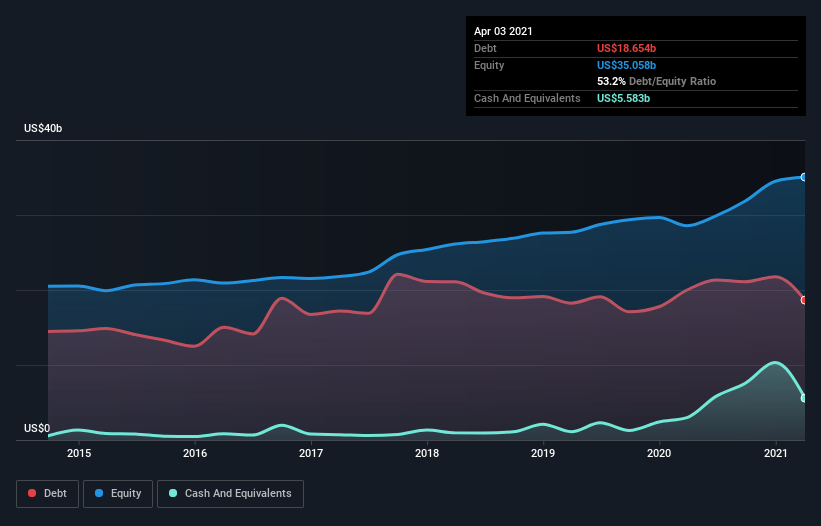- United States
- /
- Life Sciences
- /
- NYSE:TMO
Thermo Fisher Scientific (NYSE:TMO) Could Easily Take On More Debt

Legendary fund manager Li Lu (who Charlie Munger backed) once said, 'The biggest investment risk is not the volatility of prices, but whether you will suffer a permanent loss of capital.' So it seems the smart money knows that debt - which is usually involved in bankruptcies - is a very important factor, when you assess how risky a company is. As with many other companies Thermo Fisher Scientific Inc. (NYSE:TMO) makes use of debt. But is this debt a concern to shareholders?
When Is Debt A Problem?
Generally speaking, debt only becomes a real problem when a company can't easily pay it off, either by raising capital or with its own cash flow. In the worst case scenario, a company can go bankrupt if it cannot pay its creditors. While that is not too common, we often do see indebted companies permanently diluting shareholders because lenders force them to raise capital at a distressed price. Of course, plenty of companies use debt to fund growth, without any negative consequences. The first step when considering a company's debt levels is to consider its cash and debt together.
Check out our latest analysis for Thermo Fisher Scientific
How Much Debt Does Thermo Fisher Scientific Carry?
You can click the graphic below for the historical numbers, but it shows that Thermo Fisher Scientific had US$17.8b of debt in April 2021, down from US$20.0b, one year before. However, because it has a cash reserve of US$5.58b, its net debt is less, at about US$12.3b.

A Look At Thermo Fisher Scientific's Liabilities
Zooming in on the latest balance sheet data, we can see that Thermo Fisher Scientific had liabilities of US$7.00b due within 12 months and liabilities of US$23.9b due beyond that. Offsetting these obligations, it had cash of US$5.58b as well as receivables valued at US$6.34b due within 12 months. So its liabilities total US$19.0b more than the combination of its cash and short-term receivables.
Since publicly traded Thermo Fisher Scientific shares are worth a very impressive total of US$198.5b, it seems unlikely that this level of liabilities would be a major threat. Having said that, it's clear that we should continue to monitor its balance sheet, lest it change for the worse.
In order to size up a company's debt relative to its earnings, we calculate its net debt divided by its earnings before interest, tax, depreciation, and amortization (EBITDA) and its earnings before interest and tax (EBIT) divided by its interest expense (its interest cover). The advantage of this approach is that we take into account both the absolute quantum of debt (with net debt to EBITDA) and the actual interest expenses associated with that debt (with its interest cover ratio).
Thermo Fisher Scientific's net debt is only 0.99 times its EBITDA. And its EBIT easily covers its interest expense, being 20.2 times the size. So we're pretty relaxed about its super-conservative use of debt. Even more impressive was the fact that Thermo Fisher Scientific grew its EBIT by 134% over twelve months. If maintained that growth will make the debt even more manageable in the years ahead. The balance sheet is clearly the area to focus on when you are analysing debt. But ultimately the future profitability of the business will decide if Thermo Fisher Scientific can strengthen its balance sheet over time. So if you're focused on the future you can check out this free report showing analyst profit forecasts.
Finally, a company can only pay off debt with cold hard cash, not accounting profits. So the logical step is to look at the proportion of that EBIT that is matched by actual free cash flow. Over the last three years, Thermo Fisher Scientific recorded free cash flow worth a fulsome 88% of its EBIT, which is stronger than we'd usually expect. That puts it in a very strong position to pay down debt.
Our View
Happily, Thermo Fisher Scientific's impressive interest cover implies it has the upper hand on its debt. And the good news does not stop there, as its conversion of EBIT to free cash flow also supports that impression! Overall, we don't think Thermo Fisher Scientific is taking any bad risks, as its debt load seems modest. So the balance sheet looks pretty healthy, to us. The balance sheet is clearly the area to focus on when you are analysing debt. However, not all investment risk resides within the balance sheet - far from it. Case in point: We've spotted 2 warning signs for Thermo Fisher Scientific you should be aware of.
Of course, if you're the type of investor who prefers buying stocks without the burden of debt, then don't hesitate to discover our exclusive list of net cash growth stocks, today.
If you decide to trade Thermo Fisher Scientific, use the lowest-cost* platform that is rated #1 Overall by Barron’s, Interactive Brokers. Trade stocks, options, futures, forex, bonds and funds on 135 markets, all from a single integrated account. Promoted
Valuation is complex, but we're here to simplify it.
Discover if Thermo Fisher Scientific might be undervalued or overvalued with our detailed analysis, featuring fair value estimates, potential risks, dividends, insider trades, and its financial condition.
Access Free AnalysisThis article by Simply Wall St is general in nature. It does not constitute a recommendation to buy or sell any stock, and does not take account of your objectives, or your financial situation. We aim to bring you long-term focused analysis driven by fundamental data. Note that our analysis may not factor in the latest price-sensitive company announcements or qualitative material. Simply Wall St has no position in any stocks mentioned.
*Interactive Brokers Rated Lowest Cost Broker by StockBrokers.com Annual Online Review 2020
Have feedback on this article? Concerned about the content? Get in touch with us directly. Alternatively, email editorial-team (at) simplywallst.com.
About NYSE:TMO
Thermo Fisher Scientific
Provides life sciences solutions, analytical instruments, specialty diagnostics, and laboratory products and biopharma services in the North America, Europe, Asia-Pacific, and internationally.
Solid track record and good value.
Similar Companies
Market Insights
Community Narratives



